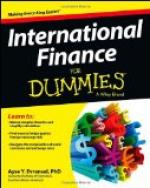“And we, we shall die, and Islam will wither away, and the Englishman, leaning far over to hold his loved India, will plant a firm foot on the banks of the Nile, and sit in the seats of the Faithful, and still that sleepless rock will lie watching, and watching the works of the new, busy race, with those same sad, earnest eyes, and the same tranquil mien everlasting.”
After the building of the Canal, the command of this short cut to India made Egypt still more important. England bought shares in the Canal, so using finance as a means to a political object; and it did so still more effectively when it used the Egyptian default and the claims of English bondholders as an excuse for taking its seat in Egypt and sitting there ever since. The bondholders were certainly benefited, but it is my belief that they might have whistled for their money until the crack of doom if it had not been that their claims chimed in with Imperial policy. It may have been wicked of us to take Egypt, but if so let us lay the blame on the right doorstep and not abuse the poor bondholder and financier who only wanted their money and were used as a stalking horse by the Machiavellis of Downing Street. Mr Brailsford’s own account of the matter, indeed, shows very clearly that policy, and not finance, ruled the whole transaction.
In South Africa there was no question of default, or of suffering bondholders. There was a highly prosperous mining industry in a country that had formerly belonged to us, and had been given back to its Dutch inhabitants under circumstances which the majority of people in this country regarded as humiliating. On this occasion even the pretext was political. It may have been that the English mine-owners thought they could earn better profits under the British flag than under the rule of Mr. Kruger, though I am inclined to believe that even in their case their incentive was chiefly a patriotic desire to repaint in red that part of the map in which they carried on their business. Certainly their grievance, as it was put before us at home, was frankly and purely political. They said they wanted a vote and that Mr. Kruger would not give them one. That acute political thinker, Mr. Dooley of Chicago, pointed out at the time that if Mr. Kruger “had spint his life in a rale raypublic where they burn gas,” he would have given them the votes, but done the counting himself. But Mr. Kruger did not adopt this cynical expedient, and public opinion here, though a considerable minority detested the war, endorsed the determination of the Government to restore the disputed British suzerainty over the Transvaal into actual sovereignty. Subsequent events, largely owing to the ample self-government given to the Transvaal immediately after its conquest, have shown that the war did more good than harm; and the splendid defeat of the Germans by the South African forces under General Botha—our most skilful opponent fifteen years ago—has, we may hope,




